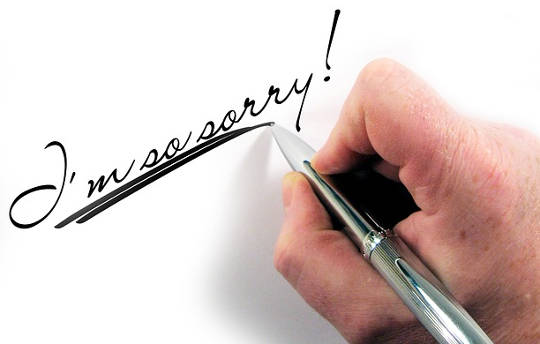
Forgiveness is radical. Both forgiving and asking for forgiveness go against deeply ingrained psychological and political truths. We fight against it. We reject its premises. We think we want to be -- or at least, want to appear to be -- blameless at all times. Admitting mistakes announces to the world that we are, after all, blameworthy. But forgiving others who have hurt us clears the playing field and introduces moral equity to the equation: By forgiving another we are willingly giving up claims to moral superiority.
Judaism and Christianity both give forgiveness a central place in their teachings. Judaism devotes a major part of its devotional message during the period of the new year (Rosh Hashanah/Yom Kippur) to the difficult work of forgiveness. It recognizes that people have to wrench themselves out of old grooves to do this, and have to turn themselves in new directions. Only then can they begin to get in touch with this most spiritual of transformations.
Molly was a widowed homeowner in her mid-50s. Plumbing was one household skill she had never attempted. When the shower in her mother-in-law apartment failed to work, Molly called (from her very short list of carpenters and plumbers) her friend Peter, a man she had worked with on a city commission. Peter gave Molly an estimate, brought along his assistant, and performed what turned out to be a more complicated job than was first expected.
When Peter handed Molly a final bill that was $100 over the estimate, Molly looked at it, looked up at Peter, and tried to figure out what she should do. She began by asking for an explanation for the added cost. A small but bitter battle of words ensued. Molly then paid the original estimate price, after which Peter spilled out, "You never appreciate my work." Molly was flabbergasted, tried to protest, but realized it was useless. Peter had been holding this in for quite some time. She made a quick calculation and concluded that Peter cared more about being insufficiently appreciated than she cared about the $100. She started to write the $100 check when Peter simply walked off in a huff mumbling "Forget it," which left Molly feeling baffled, rejected, and upset.
After three weeks or so, Molly spied Peter at an adult education class they were both attending. Molly knew what she wanted to do -- she had, been thinking about it a lot -- but didn't know if she had the courage to do it. When Peter walked mutely by her during a class break, Molly put her hand lightly on, his jacketed arm.
"Peter, I apologize for any pain or unhappiness I caused you. I didn't intend it. I'm sorry. I truly hope you will forgive me."
Peter smiled a little sheepishly and said, "I forgive you, Molly."
That was it, the end. Molly had given both herself and Peter a gift, a gift that had one important quality: it was total, unqualified. She could have said -- and she had considered, many times, saying one of the following:
* We had a misunderstanding.
* We each made some blunders.
* Neither of us quite knew where the other was coming from.
* You probably were in a bad mood.
* You should have told me your feelings sooner.
But Molly understood that asking for forgiveness is best when it is without qualifications. Shakespeare voiced this thought eloquently in Portia's moving speech from "The Merchant of Venice":
The quality of mercy is not strained,
It droppeth as the gentle rain from heaven
Upon the place beneath. It is twice blest;
It blesseth him that gives and him that takes.
'Tis mightiest in the mightiest. It becomes
The throned monarch better than his crown.
An Unqualified Apology: "I Am Truly Sorry for Causing You Pain"
 Once the other party understands that you are truly sorry for causing him pain, other details, explanations, and fine points may be discussed. But unqualified apology is so powerful an antidote to resentment and hostility that further explanations are often not needed.
Once the other party understands that you are truly sorry for causing him pain, other details, explanations, and fine points may be discussed. But unqualified apology is so powerful an antidote to resentment and hostility that further explanations are often not needed.
It is easy to ask someone's forgiveness for routine or superficial mistakes. You know that your adult child, for example, will not blame you in any profound sense for forgetting to pick up his jacket at the cleaners or for not having the time to explain how to do e-mail, as you had promised.
The wrenching difficulty comes when your adult child is clearly angry at you. She may cut off communication, refuse to listen to anything you say, or go into hiding. She may act out in a variety of ways, exhibiting rudeness, using bad language, pretending that you don't count, or even that you don't exist. Basic trust is lacking. Because of this, anything you do to break down the wall of animosity is doomed to fail. Anything except, perhaps, offering forgiveness. Offering forgiveness, like its counterpart, asking for forgiveness, is best when it is total and unqualified. One may acknowledge the guilt of the other; one forgives anyway.
Asking for forgiveness is a heartfelt, transformative, spiritual act. It is also a practical strategy for cleaning out unexamined grievances and, sometimes, festering wounds. It is a way of bringing sunshine and fresh air into a parent/adult child relationship, and of starting afresh on a new, wide pathway. In order to get to a place where you can forgive him you have to come to grips with:
* your own animosity toward your child,
* your own sense that the conflict between you is his fault, not yours,
* alternatively, your abiding sense that all his problematic qualities are, at bottom, your fault -- and your pain in facing this.
Asking For Forgiveness: Recognizing the Other Is In Pain
A good place to begin is to accept on faith that your angry, sullen, or acting-out adult child is in pain. Some of that pain may have been caused by you. This is not the place or time for self-blame, however. Your less-than-perfect parenting came down to you through countless generations of imperfect parents, each working from faulty models and each trying to do her best. You -- along with everyone else -- are doing your best.
Your adult child's pain can easily be inferred if you try to remember your own pain as a young adult. With a little effort you can remember how you wanted to achieve so you could show your parents that you could live up to their expectations; how you felt competitive with one or another of your parents and were never quite good enough; how they seemed always to love younger sister or older brother more than you; how they refused to even try to understand your differences in lifestyle. If you can remember (and re-live, for a short spell) the pain you experienced in relating to your parents, you can more readily accept your adult child's parent-related pain.
It is a short step from recognizing your child's pain to asking her for forgiveness. The words will come and they will be authentic -- your words, no one else's. Best of all, your adult child will know that they are coming from a place of truth, even as she wonders what this new development is all about. Her inner ear will be making contact with your inner voice, a place beyond or before words.
Asking For Forgiveness Leads to the Flip Side: Forgiving Others
Asking for forgiveness has a flip side which should not be neglected in your search for wholeness -- namely, forgiving others. Have you forgiven your parents yet? Really forgiven them for any and all of the hurts they caused you? You may not be ready to do so -- your confusion, anger, or inability to grow may be blocking the channels through which forgiveness travels. Never mind. You can start by focusing on someone who has hurt you -- perhaps inadvertently, perhaps long ago -- another relative, a teacher, a friend, or a co-worker.
Practice mentally forgiving this person. First, tell them -- in your thoughts -- how they hurt you. Take as long as you like. Get it all out. Then think about the many ways this person is like you. Think about this person's pain if you can infer it from her behavior. Imagine -- really imagine -- that this person was trying her best. When you feel ready, tell her in your heart that you forgive her. Finally, ask yourself if your words reflect your feelings accurately. If not -- if you still bear a grudge -- don't give up. Try again.
When you have begun to feel comfortable with forgiveness and have been able to forgive at least one other problematic person in your life, it may be the right moment to think about ways you can forgive your adult child. Did he cause you shame and embarrassment by wetting his pants, sucking his thumb, or eating with his fingers way beyond toddlerhood? Did he cut school promiscuously and fail to graduate? Did she make a terrible marriage at the age of 18 only to get divorced two years later? Did she have an out-of-wedlock baby which you ended up taking care of while she worked? Did you give him some small business start-up money which he squandered? Did she borrow your new car without your permission, putting scratches and dents on the front fender?
Some of these, and the many similar parent/child scenarios and soap operas that accompany the growing-up process, may have bedeviled you. It may be time to mark them off the ledger, to clean the slate. Make this your jubilee year. Even though your adult child isn't expecting a statement of forgiveness from you he will hang on to every word you utter and consider your sentences coin of the realm. But remember:
* Forgiveness has to feel right, to be natural.
* Forgiveness has to come from the heart.
* Forgiveness is underlined by a touch, a hug, a smile.
By forgiving your adult child and asking him for forgiveness you have set the stage for your third and most difficult (but most rewarding) area of self-development -- freedom.
Reprinted with permission of New Society Publishers.
©2001. http://www.newsociety.com
Article Source
All Grown Up: Living Happily Ever After with Your Adult Children
by Roberta Maisel.
 All Grown Up describes how mid-life parents and their grown children can celebrate life together by developing loving and egalitarian friendships that are positive and guilt-free. Using conflict resolution strategies borrowed from the field of mediation, a healthy respect for generation-gap issues engendered by the social revolutions of the 1960s and '70s, and a broad spiritual perspective, the author provides both practical solutions to on-going problems, as well as thought-provoking discussions of how these problems came to be.
All Grown Up describes how mid-life parents and their grown children can celebrate life together by developing loving and egalitarian friendships that are positive and guilt-free. Using conflict resolution strategies borrowed from the field of mediation, a healthy respect for generation-gap issues engendered by the social revolutions of the 1960s and '70s, and a broad spiritual perspective, the author provides both practical solutions to on-going problems, as well as thought-provoking discussions of how these problems came to be.
Info/Order this book
About the Author
 ROBERTA MAISEL is a volunteer mediator with Berkeley Dispute Resolution Service in Berkeley, California. She is an enthusiastic parent of three grown children and, at various times in her life, has been a school and college teacher, antique shop owner, piano accompanist, and political activist working with and for Central American refugees, homeless people and Middle East peace. She has given talks and workshops on aging, living with loss, and getting along with adult children.
ROBERTA MAISEL is a volunteer mediator with Berkeley Dispute Resolution Service in Berkeley, California. She is an enthusiastic parent of three grown children and, at various times in her life, has been a school and college teacher, antique shop owner, piano accompanist, and political activist working with and for Central American refugees, homeless people and Middle East peace. She has given talks and workshops on aging, living with loss, and getting along with adult children.



























